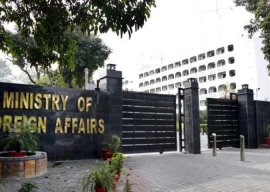
Pakistan is leading other markets in the grouping of South Asia Growth Economies-West regions that includes countries like Bangladesh, Sri Lanka, Nepal and Bhutan, according to Akkasha Sultan who is Regional Director Applications for Association of Southeast Asian Nations (ASEAN) countries.
Serving as the headquarters for the SAGE-W region, the country is ahead of its regional counterparts in terms of adopting technologies and transformation at a large scale, Sultan said in an interview with The Express Tribune at the company’s office in Karachi last week.
“Pakistani market is growing at a very fast pace. It is one of our major markets in terms of revenues,” Sultan said, however, refusing to disclose the financial information for competition reasons.
“While some other vendors closed their businesses, our investment in Pakistan is growing,” the director said.
Based in Singapore, Sultan is looking at Commercial Application Business as well as Cloud Strategy for all the ASEAN – a combination of 17 countries including Pakistan, Bangladesh, Sri Lanka, Nepal, Bhutan and more developed markets like Malaysia, Indonesia, Philippines, Singapore and Thailand. SAGE-W, he said, reports back to Singapore, the headquarters for the ASEAN region.
The database solutions giant has 1,100 customers using different technologies, applications, and middleware. Its major clients include telecom, financial services, manufacturing and related industries – within manufacturing, textile is their biggest sector.
“We are focusing a lot on small and medium-size enterprises (SMEs) including textile, fast moving consumer goods, retail, insurance and tier two financial services,” Sultan said, adding the company was looking at major projects in utility reforms, tax reforms, e-governance projects, financial modernisations in financial services, and cloud application strategy for all of these sectors.
“In future, I won’t be surprised to see Pakistan as one of the fastest growing markets for adopting cloud technology,” Sultan said. “It makes sense for them [Pakistan] to go to cloud especially when they have scarcity of resources,” he said.
“Cloud is going to be one of the biggest enablers for emerging markets like Pakistan,” Sultan said. With the adoption of cloud technology, he said customers could bring in best practices adopted by Fortune 500 companies, which means companies in Faisalabad would be using the same applications as those in the US and the UK.
Many companies in Pakistan already have cloud as part of their strategy but the adoption rate is slow, according to Sultan. He further said the country would soon adopt cloud technology.
“Pakistan’s biggest challenge is connectivity across the country, however, we see an opportunity if 3G is coming in, and we see that with 3G the data on mobile devices will be very high and that’s where it enables these applications to be used in the right way,” Sultan said. The future is very promising for Pakistan, he said, and 3G would transform business in a much faster way.
Oracle is also working with a network of 56 partners and academic institutes to create skilled workforce that can help the implementation of their solutions.
The company is exposing students to simulating environments where they are working on live projects through Oracle’s partners in Pakistan. “This is helping us create a pool of talented individuals in the market,” Sultan said.
Oracle Academy is one classic example, which works with educational institutes and universities in Pakistan to provide academic material and initiatives to all these students on applications and database technologies on Java, Sultan says. These education institutes, he says, are helping the company create a pool of talented and skilled individuals who are working on different initiatives of the company.
Giving an example, Sultan said, Higher Education Commission of Pakistan is one of the first examples, where the government decided to automate campuses of few public universities in Pakistan. “This is the largest deployment of Oracle’s Peoplesoft Campus Solutions in Asia Pacific,” he said. Bangladesh’s University Grants Commission (UGC) has followed the footstep of HEC Pakistan, according to Sultan, and more similar organisations in the region are eying on Islamabad to replicate this strategy.
Moreover, this pool of trained workforce is helping the company deploy its solutions in international markets – an added advantage of the country’s resources.
Published in The Express Tribune, April 2nd, 2014.
Like Business on Facebook, follow @TribuneBiz on Twitter to stay informed and join in the conversation.



1732883922-0/diddy-(48)1732883922-0-165x106.webp)


1732864055-0/Express-Tribune-(1)1732864055-0-270x192.webp)


1732870002-0/BeFunk_§_]__-(73)1732870002-0.jpg)
1732877973-0/Express-Tribune-(5)1732877973-0-270x192.webp)






COMMENTS
Comments are moderated and generally will be posted if they are on-topic and not abusive.
For more information, please see our Comments FAQ